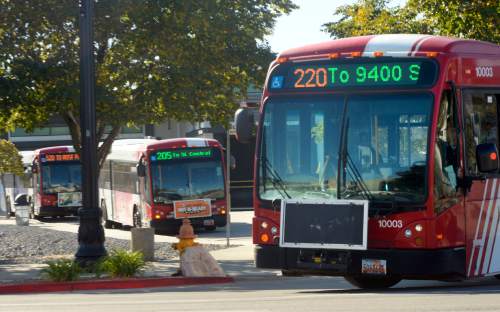This is an archived article that was published on sltrib.com in 2016, and information in the article may be outdated. It is provided only for personal research purposes and may not be reprinted.
The Utah Transit Authority is in a tie for the nation's least-affordable bus fares among 20 major-city transit agencies, according to a new study.
But UTA disputes that, saying the study fails to take into account the many discounts it offers. It says its fares actually are "among the lowest compared to our peers."
The study by the Atlanta Regional Commission and Neighborhood Nexus looked at a combination of normal bus fares charged by 20 transit agencies and the minimum wage in each area.
UTA's normal one-way fare is $2.50. The study says a worker making the minimum wage in Utah — the federally mandated minimum of $7.25 an hour — would need to work 41 minutes to afford round-trip bus fare.
That tied for the least affordable among agencies evaluated, along with the MARTA bus system in Atlanta and DART in Dallas. Atlanta and Dallas also have normal one-way bus fares of $2.50, and use the federal minimum wage of $7.25 an hour.
The most affordable system was WMATA in Washington, D.C., where one-way fare is $1.75 and the local minimum wage is $10.50. A minimum-wage worker there would need to work only 20 minutes to afford round-trip fare, less than half the time required in Utah.
UTA spokesman Remi Barron said the study is "inherently unfair to UTA."
He complained that it looks only at UTA's normal cash fare of $2.50. He notes that a longtime promotion for people who use the agency's electronic FAREPAY cards offers a 40 percent discount, reducing one-way bus fare to $1.50.
"UTA also offers many other discounts and a free-fare zone [in downtown Salt Lake City], something some other systems don't," he said.
"Most of our riders do not pay the full cash fare," he said, because of monthly passes, passes provided by employers or universities, or other discounts for seniors, youths and others.
He also said the study "is comparing fares to minimum wages and Utah is tied to the federal mandatory minimum wage, which is much lower than many other states."
Other transit agencies included in the Georgia study were in Birmingham, Ala.; Boston; Charlotte, N.C.; Chicago; Denver; Houston; Miami; Nashville, Tenn.; New York City; Orlando, Fla.; Phoenix; Portland, Ore.; San Francisco; Savannah, Ga.; and Seattle.
"UTA's fares are among the lowest compared to our peers," Barron said, and provided a list of fares by 13 such agencies in Atlanta, Charlotte, N.C., Cleveland, Dallas, Denver, Las Vegas, Minneapolis, Minn., Portland, Ore., Sacramento, Calif., St. Louis, San Diego and Seattle.
Five of those cities charge the same $2.50 base fare as UTA. Four cities use higher base fares, and four have lower ones.
But Barron said the FAREPAY discounted fare of $1.50 is lower than the base fares in all those other "peer" agencies.
George Chapman, a member of the watchdog Utah Transit Riders Union, said while he likes that cheaper FAREPAY card promotion, he believes UTA does not advertise it enough — so too few people take advantage of it.
"I ride the bus every day, and I see most people still pay with cash," he said. "UTA doesn't advertise it [the promotion] anymore. I've asked them to put up signs in the buses to let people know about it, but they haven't."
Barron also said UTA has not "had a fare change since 2013, while many agencies have raised fares recently."
UTA is in the process of reviewing its fare structure.
A written report to UTA Board members earlier this month said, "Staff is currently working on UTA's future fare policy, developing a comprehensive multi-year proposal for the public fare structure."
It added that it hopes to unveil that proposal during the second quarter this year, "after which staff will conduct a pro-active public outreach and input effort."



